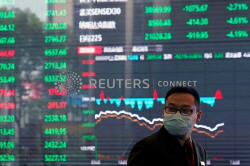China's market euphoria trumps political risk in Hong
Kong
 Send a link to a friend
Send a link to a friend
 [July 09, 2020] By
Samuel Shen and Noah Sin [July 09, 2020] By
Samuel Shen and Noah Sin
SHANGHAI/HONG KONG (Reuters) - Investors in
China's soaring stock market are increasingly turning to Hong Kong for
bargains, egging on an investment boom on the back of large tech
listings and shaking off fears of political risks in the bruised
financial hub.
The country's blue-chip CSI300 index <.CSI300> hit five-year-highs in
recent sessions on a state-endorsed rally and a retail trading frenzy.
But Chinese investors and brokerages say they are increasingly drawn by
Hong Kong shares, whose gains have been more modest.
"Elephants are dancing (in mainland China), but in Hong Kong, many
stocks are lying on the floor," Shen Weizheng, senior advisor at
brokerage Direct Access, said during an online pitch to mainland
investors on Wednesday.
"Buy more Hong Kong stocks. You don't lose money buying bargains."

Mainland-listed A-shares are on average 35% more expensive than their
Hong Kong-listed peers, also called "H-shares" <.HSCE>, widening from
23% just a month ago <.HSCAHPI>. Share prices of the same company often
differ vastly in the two markets.
A growing number of U.S-listed Chinese internet companies, including
NetEase <9999.HK> and JD.com <9618.HK>, have chosen to float in Hong
Kong through secondary listings amid heightened Sino-U.S. tensions.
New York-listed Alibaba <9988.HK> <BABA.N>, which completed its Hong
Kong listing last year, could get the greenlight to enter the benchmark
Hang Seng Index <.HSI> next month.
"Capital is flowing into the city. The more intense the rivalry between
the U.S. and China, the more unique Hong Kong will be as a centre to
welcome back leading Chinese companies listed in the U.S.," said Hao
Hong, managing director at BOCOM International.
With many more Chinese listings in the pipeline, "such investment
opportunities can last for at least two years, potentially generating
annualised returns of 20%," said Richard Li, general manager of
Shanghai-based Regan Fund Management Co, which has been actively
investing in such listings.
GROWING POWER
The surge in investment from the mainland comes as Hong Kong becomes
increasingly isolated from traditional western trading partners due to
Beijing's growing political reach into the financial hub.
[to top of second column] |

A man wearing a protective mask is seen inside the Shanghai Stock
Exchange building, as the country is hit by a new coronavirus
outbreak, at the Pudong financial district in Shanghai, China
February 28, 2020. REUTERS/Aly Song/File Photo

China's new National Security Law for Hong Kong, effective last week, is the
latest flash point between Beijing and Washington, adding to other points of
tension such as trade and tech supremacy.
Mainland interest in Hong Kong stocks, however, has only gone up.
Southbound turnover under the cross-border Stock Connect hit record levels on
Monday. Net mainland purchases of Hong Kong stocks under connect totaled HK$300
billion ($38.71 billion) during the first six months, exceeding last year's
total.
Accelerating Chinese inflows also help strengthen the Hong Kong dollar <HKD=D3>.
"Stock valuation in Hong Kong is still attractive, so it's natural for abundant
mainland money to spill over," said Hong Kong-based online brokerage Futu <FUTU.O>.
The brokerage, which mainly serves wealthy Chinese, witnessed a surge in trading
volume on its platform this year.
Mainland money is largely behind the 230% surge this year in Hong Kong-listed
shares of Semiconductor Manufacturing International Corp (SMIC)<0981.HK>, which
is expected to command lofty valuations when it lists on Shanghai's STAR Market.
For Hong Kong stocks such as SMIC, "what's happening in the China market is
changing the companies' narratives," Liu Youpu, partner at Shanghai-based hedge
fund house Aifanzhe Investment Management Co said.

"We expect to see growing pricing power by mainland investors in the Hong Kong
market."
($1 = 7.7500 Hong Kong dollars)
(Reporting by Samuel Shen and Noah Sin; Editing by Sam Holmes)
[© 2020 Thomson Reuters. All rights
reserved.] Copyright 2020 Reuters. All rights reserved. This material may not be published,
broadcast, rewritten or redistributed.
Thompson Reuters is solely responsible for this content. |